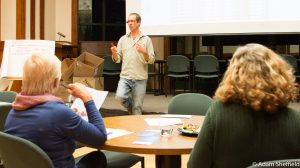Front Porch Blog

Appalachian Voices’ Energy Policy Director Rory McIlmoil addresses attendees of the first-ever Boone Energy Stakeholder Meeting.
Last week, the first-ever Boone Energy Stakeholder Meeting brought together stakeholders from across Boone, N.C., to discuss the problem of energy waste in the town and explore possible solutions.
Attendees included Boone Mayor Rennie Brantz, Karla Rusch from Appalachian State University, Phil Trew from the High Country Council of Governments, Jeremy Barnes from Appalachian Mountain Brewery, Tommy Brown from F.A.R.M. Cafe and Appalachian Voices’ North Carolina Energy Savings team.
One of the biggest challenges identified by the stakeholders was the quality of Boone’s existing housing stock. Properties that were built quickly to house Boone’s growing population and Appalachian State University’s students often prioritized expedience and profit over energy efficiency. The design of some properties even encourages energy waste.
Several stakeholders shared stories of students and ASU staff having to open their apartment or office windows during winter to control the room temperature because there was only one thermostat for the entire building. Boone resident Barbara Talman also pointed out that many homes in the area were originally built for summer use only and were therefore not properly insulated. Now, those homes are being lived in all year round, and the residents are stuck with high energy bills in the winter.
Weatherizing and retrofitting these inefficient buildings is a challenge. The high upfront costs of upgrades are a barrier to improving home energy efficiency, not only in Boone but across the nation. Boone also has a high proportion of renters. Owner-occupied housing accounts for just 20.2 percent of housing units, according to the U.S. Census Bureau. Landlords for rental properties are less likely than homeowners to invest in energy efficiency because they don’t pay the electricity bills, or otherwise lack incentive to invest thousands of dollars to improve the energy efficiency of their properties. The programs that do exist to help finance home energy upgrades are often not available to renters. This includes Blue Ridge Electric’s new Energy SAVER Loan Program and the housing rehabilitation programs administered by the High Country Council of Governments.
Even if financing is available for retrofits, finding qualified workers to complete the upgrades can be a headache. Tommy Brown, the volunteer coordinator at F.A.R.M. Cafe and a participant in the Energy SAVER Loan Program, pointed out the lack of local contractors, especially in the heating and cooling sector. Brown received the loan in June, but he is still waiting for work on his home to begin because no contractors are available.
Meeting participants came up with several ways to expand the number of qualified contractors, including improving communication of workforce needs and increasing funding for workforce training. In addition, developing affordable housing in the town of Boone would ensure that the newly trained workforce stays in the region and can help make the town more energy efficient.
The issue of energy efficiency is just one piece of a larger affordable housing puzzle here in Boone. According to Mayor Rennie Brantz, only two town employees live within town limits because the high demand for housing makes finding an affordable place to live nearly impossible. For the same reason, many of the employees at ASU commute to work from outside of Boone. The creation of affordable, non-student housing in town would cut down on energy waste from long commutes and contribute to the development of a sustainable economy.
Another solution proposed at the stakeholder meeting would be for the town government to actively promote energy efficiency. Officials could create something similar to the town’s successful water conservation program that would target energy waste in Boone. Housing ordinances could also be used to mandate certain efficiency measures.
Several participants noted ASU’s longstanding commitment to sustainability and pointed out that there’s an opportunity for the university to collaborate with the Town of Boone to develop efficiency solutions. The students at ASU are also a useful resource. Many students care about environmental issues and could be leveraged to demand energy efficiency upgrades from rental companies. The student rental market is very competitive due to an excess in supply of at least 2,000, so the rental companies would likely respond to student pressure. ASU could even develop a system to rank student rental properties based on how efficient they are to encourage companies to invest in energy upgrades.
Overall, while some key local stakeholders were unable to attend the meeting, Appalachian Voices and the stakeholders who attended agreed that it was a good first step toward identifying comprehensive solutions that could help tackle the problem of energy waste for the Town of Boone. To continue the conversation, Appalachian Voices will be organizing a second meeting in early December to further discuss these solutions.
Do you know someone that should be at these meetings, or are you interested in attending yourself? Contact Rory McIlmoil at 828-262-1500 or rory@appvoices.org to let us know.
PREVIOUS
NEXT
Related News

Leave a comment
Your email address will not be published. Required fields are marked *

Leave a Comment